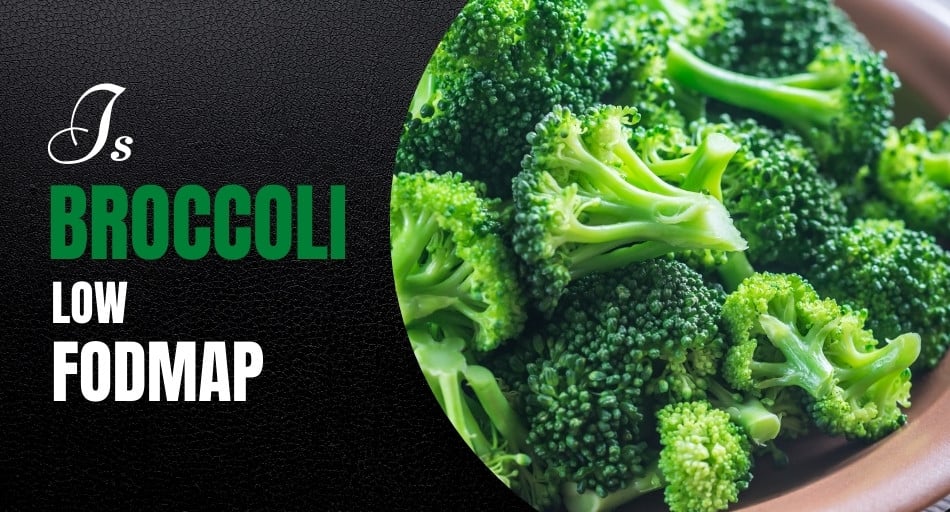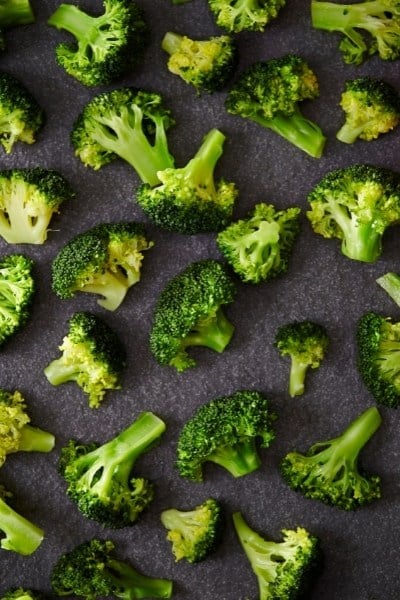People who suffer from stomach issues, especially irritable bowel syndrome (IBS), often need to follow special diets to avoid more issues. One way to do that is to follow a low FODMAP diet.

The basic principle behind a low FODMAP diet is to consume very few foods containing fermentable carbs.
These short-chain nondigestible carbs tend to trigger digestive system issues like bloating, gas, stomach pain, and constipation.
Luckily, many fresh fruits and veggies fit this diet, even if in small amounts. For example, is broccoli suitable for a low FODMAP diet? Or should you limit how often you consume it?
Table of Contents
Is Broccoli Low FODMAP?
Broccoli can be low FODMAP, but it depends on how you prepare it and what part of it you consume. For example, broccoli florets are much lower in FODMAPs than broccoli stems, so keep that in mind if you follow a diet especially low in FODMAPs.
On the bright side, broccoli is an excellent source of various nutrients like fiber, vitamin C, vitamin K, and various antioxidants. Because of that, it’s a great addition to any healthy, balanced diet.
How low in FODMAPs is broccoli?

Moderate servings of broccoli florets are low in FODMAPs, which means you can safely consume them even if you have to strictly limit your consumption of these carbs.
On the other hand, broccoli stems are slightly higher in FODMAPs. So, you might want to be careful about consuming them, especially if FODMAPs trigger your symptoms quite badly.
This doesn’t mean that you can’t consume them, but make sure to keep that in mind.
If you consume a mix of broccoli florets and stems, aim for a serving of around ¾ of a cup.
That way, you won’t get a lot of FODMAPs, but you’ll still reap wonderful health benefits from this veggie.
Is broccoli good for you?
Broccoli is a very low-calorie but nutritious stalk vegetable. In fact, a single one-cup serving of cooked broccoli contains just about 55 calories.
This isn’t a lot, considering how many vitamins and minerals it comes with.
This veggie is also a great source of fiber, providing you with 20% of your daily recommended need for this nutrient. Fiber has several functions in your body, including soaking up excess stomach acid, increasing the feeling of fullness after eating, and feeding the ‘good’ gut bacteria.
So, make sure to eat a varied selection of high-fiber foods like broccoli.

Broccoli is also an excellent source of vitamin C, also known as ascorbic acid. This vitamin helps boost your immune system, reducing the risk of various chronic diseases. It also prevents iron deficiency by improving the absorption of this mineral.
Vitamin C also works as a powerful antioxidant that removes free radicals from your body. This prevents oxidative stress and damage to your cells and prevents various chronic issues.
Another vitamin found in large amounts in broccoli is vitamin K. Just one cup of cooked broccoli provides you with all the vitamin K you need in a day.
This micronutrient is important for bone metabolism and the formation of blood clotting factors.
Vitamin K is a fat-soluble nutrient. So, make sure to eat foods containing it with a side of healthy fats like salmon, avocado, or red meat to ensure good absorption.
According to other research, the plant compounds found in broccoli can help reduce your risk of several types of cancer, including lung, colorectal, breast, prostate, pancreatic, and gastric cancers.
This is because these compounds have strong anti-inflammatory properties that reduce inflammation and prevent chronic inflammation – all of which reduce your risk of cell mutations and cancer.
Eating broccoli can also improve your eyesight, as this veggie contains lutein and vitamin A.

This plant compound and vitamin work together to help prevent age-related eye disorders as well as macular degeneration in older adults.
So, make sure to load up on these nutrients, especially lutein, as they’re crucial for your health.
Is eating broccoli bad on a low FODMAP diet?
Since broccoli is low in FODMAPs, it’s a safe addition to a low FODMAP diet. It’s also rich in stomach-friendly vitamins and minerals as well as lots of fiber and antioxidants.
All of these nutrients and plant compounds together contribute to a healthy digestive system and may even improve the symptoms of IBS and other conditions.
When eating broccoli on a low FODMAP diet, make sure to remove as much of the stem as possible.
This part is higher in FODMAPs, so it might trigger unpleasant symptoms in a lot of people. But if you don’t experience any negative side effects, you can still eat that part.
So, you can safely include broccoli in your diet even if you monitor your intake of FODMAPs.
How can you best prepare broccoli for a low FODMAP diet?
Broccoli is always low in FODMAPs, but there are certain cooking methods that can make it even better for people with stomach issues.
Experts recommend gently steaming your broccoli. This method helps prevent any loss of nutrients and makes the carbs in broccoli much easier for your stomach to digest, which is great for people with stomach problems.

When steaming your broccoli, make sure to cut off any harder parts of the stem. This is not only because they’re hard on your stomach, but they’re also higher in FODMAPs than the florets. So, it’s better to avoid them.
Another good way is to roast your broccoli with some fresh garlic for added flavor. Overall, as long as you don’t stir fry your broccoli, it should be safe for your digestive tract.
Conclusion
Broccoli is relatively low in FODMAPs, which means that those suffering from IBS or other digestive system issues can safely eat it. It also contains a lot of fiber, a beneficial nutrient for the health of your gut.
On top of that, broccoli is loaded with vitamins, minerals, and antioxidants that all help keep you healthy by preventing various health issues from developing. So, make sure to get some broccoli next time you’re out shopping.
Sources: Nutrition Data, National Library of Medicine, and PMC
